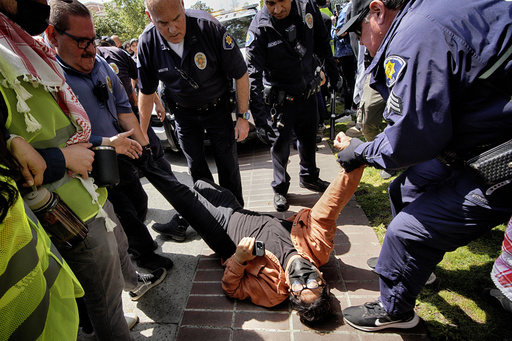University of Southern California law student Elizabeth Howell-Egan has been barred from campus due to her involvement in last spring’s anti-war protests, but she remains committed to activism. Along with other like-minded students, she is conducting online sessions regarding the Israel-Hamas conflict and distributing flyers outside the campus, which now has increased security measures such as checkpoints at entrances and mandatory ID scans by security officers. Howell-Egan, a member of the school’s Students for Justice in Palestine group, is advocating for USC to divest from companies profiting off the war, emphasizing the necessity of taking risks to effect change and shape a desired future.
The landscape for students protesting the Gaza war has intensified this fall, as universities nationwide implement stricter security protocols and protest guidelines to prevent disruptions like the pro-Palestinian demonstrations from last spring and shield students from hate speech. Despite the potential jeopardy to their academic pursuits, careers, and tuition payments, many student activists feel a moral duty to continue their advocacy efforts. While tent encampments, now prohibited on many campuses, have yet to return, students are exploring alternative forms of protest, emboldened by the escalating casualties in Gaza and significant protests in Israel urging for a ceasefire.
Amid heightened tensions over the conflict since the war broke out on October 7, resulting in fatalities and hostages, pro-Palestinian demonstrations nationwide have triggered instances of hostility towards Jewish students, including antisemitic remarks and displays. Some universities have faced civil rights investigations and lawsuits alleging inadequate responses to antisemitism. The desire to be part of a meaningful cause propels students like Temple University senior Alia Amanpour Trapp to persist with their activism, even amidst disciplinary actions. Trapp is appealing a conduct code violation ruling and remains dedicated to Students for Justice in Palestine, despite facing challenges and campus investigations.
At Brown University, students arrested during protests last spring are campaigning for the school to divest from companies linked to Israel, with a divestment proposal slated for an October vote. The push for divestment faces backlash, with some opposing the initiative on antisemitism grounds. Amidst the scrutiny, student activists at Brown are steadfast in their pursuit of justice and peace, emphasizing the importance of standing up for what they believe in.
For Howell-Egan, who is prohibited from attending in-person classes due to her suspension following the USC protests, the restrictions have only fueled her resolve to speak out. Despite the threat of sanctions from USC and the trend of harsher penalties for student activism, she remains committed to her cause. The USC Divest Coalition, comprising various student groups, has adapted its focus off-campus to engage with the broader community and navigate the university’s new regulations. Through community outreach and teach-ins, student activists continue to sharpen their skills and deepen their understanding of the ongoing advocacy efforts they are pursuing.


